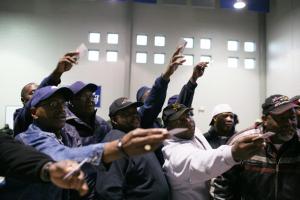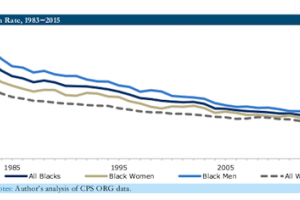GARY 1919: An Untold Story of Racial Solidarity from Gary’s History
Portside
 Given the public sector is the largest employer of African-Americans, and recognizing their substantial and traditional involvement in unions — Black workers are more likely to belong to a union than any other racial group — such anti-union campaigns as Right to Work have particular implications for African-Americans.
Given the public sector is the largest employer of African-Americans, and recognizing their substantial and traditional involvement in unions — Black workers are more likely to belong to a union than any other racial group — such anti-union campaigns as Right to Work have particular implications for African-Americans.
 The working class - who are they, what are their interests, aspirations, fears. One little-known element of the 'class cultural gap' is that the white workers resent professionals but admire the rich. Class migrants (white-collar professionals born to blue-collar families) report that 'professional people were generally suspect' and that managers are college kids 'who don't know shit about how to do anything but are full of ideas about how I have to do my job.'
The working class - who are they, what are their interests, aspirations, fears. One little-known element of the 'class cultural gap' is that the white workers resent professionals but admire the rich. Class migrants (white-collar professionals born to blue-collar families) report that 'professional people were generally suspect' and that managers are college kids 'who don't know shit about how to do anything but are full of ideas about how I have to do my job.'
 This paper finds that Black union workers of today are very different from Black union workers of the past. In particular, Black union workers today are more likely to be female, older, have more years of formal education, be immigrants, and work in the public sector.
Black union workers also enjoy higher wages, and better access to health insurance and retirement benefits than their non-union peers.
This paper finds that Black union workers of today are very different from Black union workers of the past. In particular, Black union workers today are more likely to be female, older, have more years of formal education, be immigrants, and work in the public sector.
Black union workers also enjoy higher wages, and better access to health insurance and retirement benefits than their non-union peers.
 Forty-two percent of all U.S. workers make less than $15 per hour. This is shocking but even more shocking is that more than half of African American workers make less than $15 an hour, according to the National Employment Law Project (NELP). If one delves even deeper you discover that Black women are even more ensnared in this low-wage trap, as Linda Burnham, Research Director at the National Domestic Workers Alliance (NDWA), points out.
Forty-two percent of all U.S. workers make less than $15 per hour. This is shocking but even more shocking is that more than half of African American workers make less than $15 an hour, according to the National Employment Law Project (NELP). If one delves even deeper you discover that Black women are even more ensnared in this low-wage trap, as Linda Burnham, Research Director at the National Domestic Workers Alliance (NDWA), points out.
Spread the word